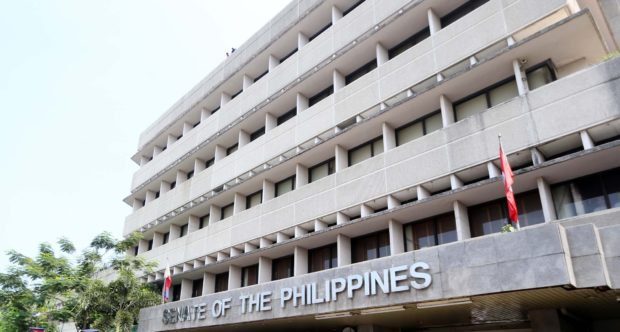MANILA, Philippines— A separate and higher minimum wage for security guards was pushed in the Senate on Tuesday, with the goal of elevating them to “world class” status.
The issue came up when the Senate committee on public order headed by Senator Ronald “Bato” dela Rosa examined House Bill No. 8783, also known as the Private Security Industry Act, which seeks to repeal the 52-year-old Private Security Agency ( PSA) law.
PLtGen Enriques Galang stressed in the hearing the need for an amendment to the law, citing the “restrictive requirements” before a PSA can be awarded a license and be certified to provide global security.
Galang is the chairman of the advisory council of the Supervisory Office for Security and Investigating Agencies (Sosia), which is under the Philippine National Police.
“Kung tayo ay natutuwang mag-export ng domestic helpers, why not professionally trained security personnel?” he said.
(If we’re happy to export our domestic helpers, why not professionally trained security personnel?)
“However, we can’t level up the training of our current guards right now whose salaries are only equivalent to a janitor’s pay in spite of the so many requirements and trainings before any guard can be issued by the Sosia of the license to exercise security profession. Ang daming requirements,” he lamented.
One of these restrictive provisions is the requirement to adhere to the minimum wage imposed by several regional tripartite wage boards, which Galang claims is only equivalent to a janitor’s salary.
“I’m not belittling the janitors but the point is the security personnel must have a higher minimum wage compared to janitors and other general workers,” he said.
Dela Rosa, however, pointed out that the minimum wage could still be raised since the law doesn’t prohibit security guards from getting paid more.
While agreeing with the senator, Galang said nobody in the industry increases the minimum wage, and there are even employers who do not pay the minimum wage to their workers.
Galang then proposed that the chief PNP be authorized to organize a separate tripartite wage board that would determine the appropriate minimum pay for the security personnel “provided they are higher than the minimum being determined by the existing regional tripartite wage boards.”
Another alternative is for existing regional tripartite wage boards to “separately” decide the minimum pay for security employees, as long as it is higher than the minimum pay for regular workers.
“And if we can increase the wages of the security professionals, then we can level up their training to prepare them to become world-class for those aspiring to be globally certified as a security provider,” Galang said.
But Dela Rosa warned that the proposal could open the floodgates for other sectors which would also demand their own salary standard.
“Baka mamaya malaking problema na yan (That would be a big problem) later on,” he said.
Galang insisted that the security industry also has a separate regulatory body and unlike other workers, security guards are required to undergo refresher and specialized courses.
“But why is it then the security guards, undergoing so many specialized trainings, will have only the same minimum wages as compared to other workers?” he further asked.
RELATED STORY
Hazard pay for contracted janitors, guards, maintenance men in public hospitals pushed


